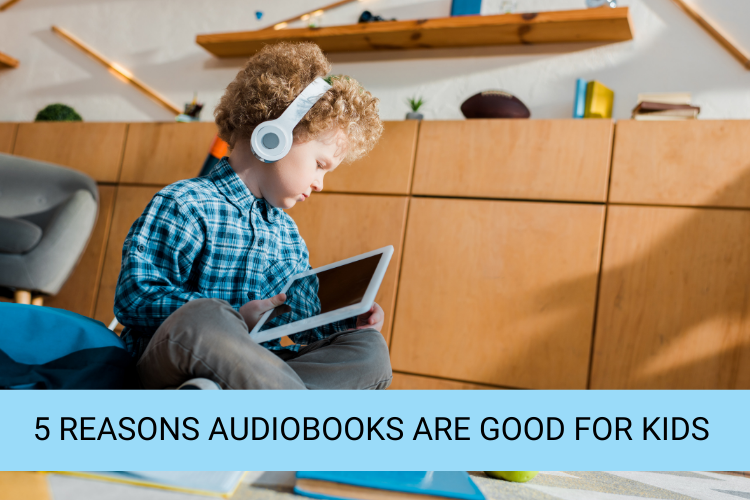Today, I’m sharing a special guest post that kicks off a series of posts from Margo L. Dill, M.A. Ed. In this post, Margo explains why you don’t need to feel bad about letting your kids listen to audiobooks! Thank you, Margo!
My ten-year-old daughter loves audio books for kids. Through the Epic website, she has been listening to the entire Whatever After book series in audio book format while she does her asynchronous schoolwork during this last year of pandemic virtual school. This experience listening to these audio books, and then deciding to read Harry Potter out loud to her, brought her to finally love reading the way I’ve wanted her to since preschool.
Sometimes for both ourselves and our kids, we wonder if audio books “count” as reading. All of my background as an elementary school teacher, Title I reading teacher and mom tells me that: yes, listening to audio books for kids is a form of reading and might be better for some kids than physical books or ebooks.
So…what’s so great about audio books?
1. Reading fluency and expression: Just like when children learn to talk from listening to their parents and connecting words with objects and meaning, children learn to read orally by listening to others read aloud. Reading fluency and expression help with comprehension as well, which is the most important part of reading. Sure, young readers need to know the words when they see them and how to pronounce them, but it’s crucial for children to understand what they are reading.
When they hear the narrator of an audio book reading aloud with perfect fluency and expression, they are learning how to mimic these reading behaviors when they read. You can start very young with books on CD from the library and easy books like: Brown Bear, Brown Bear by Eric Carle. Students can listen to the CD and read along with a physical copy while they learn what the words on the page say, how to read them at a good pace and with proper expression that matches the story action and punctuation.
Older listeners can hear different character voices and emotions through the narrator’s performance, which can help them comprehend the story better and imitate these skills while they are reading (aloud or even silently to themselves).
2. Auditory learners: Some children are auditory learners. They learn through listening more than they learn from visual or tactile lessons. These children will thrive with audio books in fiction and nonfiction. If they need to learn about a topic for a research presentation, for example, finding them an audio book with information that they can hear and understand (and even take notes) might be better for them than reading a library book and taking notes. The same is true for new vocabulary. New vocabulary read to them in an audio book might be easier for auditory learners to pick up than if they have to study it on a worksheet or see it on the Smartboard.

3. Expose students to story structure: With audio books, children (even young children) can listen to books that are above their reading levels. Because of this, they can learn about story structure and fiction elements using an audio book. If a first grader is able to listen to an audio book of a Junie B. Jones story, even if he can’t read it yet, he is learning about fiction structure and elements, such as: problem/solution, climax, rising action, resolution, character traits, and motivation. He might be able to read aloud a concept book about opposites, but he can listen to a novel to learn these important comprehension strategies at a young age. Audio books set the stage for reading children’s novels as children grow into more developed readers.
4. Comprehend more difficult concepts than they can read: As mentioned previously, kids can listen to more difficult text than they can read. From a young age, most of us can understand vocabulary and use it in conversations before we can read it and write it. So, for example, if you want young students to understand an event in history, but the texts you are finding are for two grade levels above where they are, then assign them a historical fiction audio book. Most students will be able to listen to the book and comprehend it, even if they could not read it on their own.
Vocabulary is best learned in text—meaning instead of memorizing a list or words and their meanings that aren’t connected, children can learn new vocabulary through hearing a story and in context. Audio books are perfect for this exercise.
5. Alternative entertainment in a vehicle: For parents on long road trips, the norm has become passing the time for your kids with movies—DVDs, Blu-ray discs, or even streaming on tablets and devices in the vehicle. But most of us parents and teachers are worried about too much screen time, too. So an alternative for long car rides can be audio books. You can also choose audio books the entire family can listen to like Harry Potter or some funny Judy Blume book or Sara Pennypacker’s Clementine. If the whole family is listening to and enjoying the audio book together on the road trip, that just starts your vacation off on an even better note and gives you something to discuss when you make pit stops.
Audio books are real books—they are the words an author wrote, and skilled readers (voice actor or even the author themselves) are reading the books to kids. Children are learning comprehension skills through this experience and even information about subjects needed for areas in science and social students. We can’t always be there to read to them! But audio books can be with a click of a button. So check these out for your kids today.




Comments ()